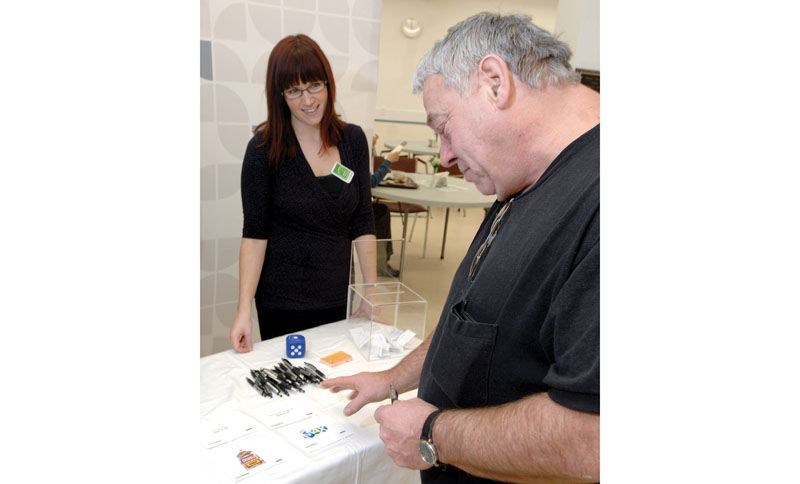Odds are that among the people who gamble in Prince George, some aren't being responsible with their gaming habits.
The British Columbia Lottery Corporation (BCLC) offers services ranging from the Treasure Cove Casino to lottery kiosks at retail outlets but this week the organization is in town to promote the tools it offers to help those who may have a problem with gambling and identify some of the myths about gaming.
"We really believe that a more informed gambler is a better gambler and will tend to make gambling about entertainment," BCLC vice-president of communications and public affairs Susan Dolinski said. "That's really what the week is focused on, making sure people are able to keep gambling fun."
Among the myths BCLC is setting out to bust is that using lucky charms or picking lucky numbers will increase odds of winning.
"The lottery does not know or recognize your lucky numbers," one brochure says. "Numbers are drawn randomly, so no particular number combination is more likely than another to come up in the next draw."
BCLC has to walk the line of promoting its products, which it does through advertising, while still getting the message out that people should be responsible when playing licensed games. The province spends about $2 million a year on services related to problem gambling and Dolinski said the services are funded in such a way that their budgets will increase if the need goes up.
Locally, BCLC has partnered with the United Way of Northern British Columbia to help organize the programs this week.
"As the United Way we want to strike that balance for the community to understand that there might be a place for gambling responsibly as long as it's not at the risk of having a large negative impact for the people in the community," United Way community programs and services co-ordinator Lori Cruddas said.
She also hopes the week's worth of activities will help to identify if problem gambling is a major issue facing local residents. The United Way spoke to some non-profit organizations in the community and found problem gambling wasn't on their radar screen at the moment.
"It could either be a really great thing, it means there's lots of responsible gamblers and it means non-profits have got resources to address it or it could mean we really need this week because we need to get the message out there, we need to bring it up to the forefront," Cruddas said.
The week kicked off Monday at the Prince George & District Senior Citizens Activity Centre Society with an information kiosk where people could learn about the odds of winning certain types of games and enter a draw. The kiosk will visit post-secondary campuses, local retails and a Cougars game over the course of the week. There will also be a launch event on Wednesday at Treasure Cove Casino and an open house and expo at CNC on Thursday afternoon.
The latter event will feature exhibits by various community groups and include presentations by problem gambling and responsible gambling experts, with the aim of creating a dialogue in the community.
Ironically, BCLC is putting on draws for prizes at its events, but Dolinski said the promotions don't contradict the message about playing responsibly.
"It's aimed at engaging folks to come and talk to us about what responsible gambling means," she said. "Many organizations use tactics like giveaways to encourage people to become interested in the information they have available, we're hoping we can encourage people to get interested in the subject, there's a lot of competition for people's mind space."
Some of the resources available for problem gamblers include a 24/7 telephone help line, information centres and advisors in casinos and a voluntary self-exclusion program for people who want to bar themselves from entering gambling sites for a specified period.
Cruddas hopes this year's awareness week won't be a one-time only event.
"I think we've opened the door to these conversations," she said. "I'm hoping that non-profits will start to call me and approach me by the end of the week and say, 'We knew we had some clients within our population that had some gambling issues, but we didn't realize the level.' "



